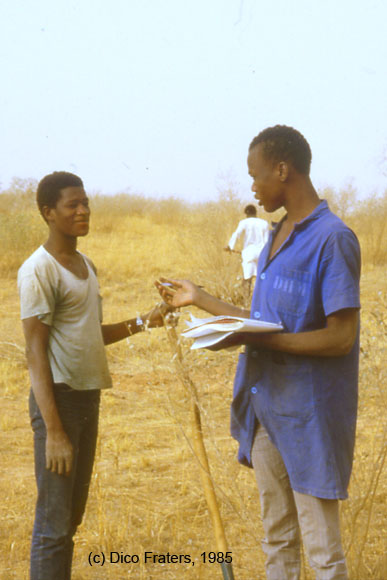Cawyaŋ Zarma Sanni |

Lesson 1. Ni kani baani?
Content |
|||||||||||||||||||||||||||||||||||||||||||||||||||||||||||||
1.A. Intro |
|||||||||||||||||||||||||||||||||||||||||||||||||||||||||||||
|
|||||||||||||||||||||||||||||||||||||||||||||||||||||||||||||
1.B. Vocabulary |
|||||||||||||||||||||||||||||||||||||||||||||||||||||||||||||
|
Learn these words by heart. Extra |
|||||||||||||||||||||||||||||||||||||||||||||||||||||||||||||
|
|||||||||||||||||||||||||||||||||||||||||||||||||||||||||||||
|
|||||||||||||||||||||||||||||||||||||||||||||||||||||||||||||
|
|||||||||||||||||||||||||||||||||||||||||||||||||||||||||||||
|
|
|||||||||||||||||||||||||||||||||||||||||||||||||||||||||||||
1.C. Greetings (fooyaŋey) |
|||||||||||||||||||||||||||||||||||||||||||||||||||||||||||||
|
Greetings form an important aspect of west African languages in general and therefore also of the Zarma language. For this reason, extra attention for this aspect of the language is self evident. Like in any language some greetings are time dependent others are not. In addition the context, i.e., the circumstance of the encounter, are of importance. In the greetings below grammar is used beyond the grammar explained in this lesson. |
|||||||||||||||||||||||||||||||||||||||||||||||||||||||||||||
Morning (to individuals only)Person A: Ni kani baani? Person B: Baani samay. Ni kani ka baan, day? Person A: Baani samay. Translation |
|||||||||||||||||||||||||||||||||||||||||||||||||||||||||||||
Afternoon (to individuals only)Person A: Ni foy baani? Person B: Baani samay. Ni foy ka baan, day? Person A: Baani samay. Translation |
|||||||||||||||||||||||||||||||||||||||||||||||||||||||||||||
|
|
|||||||||||||||||||||||||||||||||||||||||||||||||||||||||||||
1.D. Grammar |
|||||||||||||||||||||||||||||||||||||||||||||||||||||||||||||
|
It is important to realise that Zarma grammar sometimes differs from English grammar or from grammar of other European languages likes German or French. With one respect Zarma grammar is not so different, the number of exception on rules is at least equal to the number of rules and sometimes it is not possible to discover rules at all. In such cases the only way to learn the language is to learn those thing by heart. Subjects in this lesson: |
|||||||||||||||||||||||||||||||||||||||||||||||||||||||||||||
1.D.1. Personal pronounsThe personal pronouns are invariable in all cases; that is: whether used in nominative case or objective case, or as possessives. |
|||||||||||||||||||||||||||||||||||||||||||||||||||||||||||||
|
|||||||||||||||||||||||||||||||||||||||||||||||||||||||||||||
|
|||||||||||||||||||||||||||||||||||||||||||||||||||||||||||||
You will learn more about the use of the long forms of the third person singular (nga)' and third person plural (ngey and ey) later (a/o lesson 3.D.4 and 4.D.1). The initial 'n' of these two words is actually pronounced like the 'in' in the word 'linger'. |
|||||||||||||||||||||||||||||||||||||||||||||||||||||||||||||
1.D.2. Definite articleThe idea of a definite article (the) is expressed by either the vowel 'a' or 'o' on the end of the noun in the singular. As a general rule:
|
|||||||||||||||||||||||||||||||||||||||||||||||||||||||||||||
|
|||||||||||||||||||||||||||||||||||||||||||||||||||||||||||||
As there does not seem to be any rule for whether to add or change this definite indicator, the indefinite and the definite singular of all nouns are given in the vocabularies. You must learn them, as you learned whether it was feminine of masculine with each French noun. |
|||||||||||||||||||||||||||||||||||||||||||||||||||||||||||||
1.D.3. Definite plural of nounsBy replacing the final vowel of the definite singular of a noun with the definite plural ending 'ey' , the definite plural is derived. A special case is nouns with ay-endings, the definite plural is formed by either change the a-ending of the definite singular to ey or to change the o-ending of the alterative definitive form to ey. |
|||||||||||||||||||||||||||||||||||||||||||||||||||||||||||||
|
|||||||||||||||||||||||||||||||||||||||||||||||||||||||||||||
1.D.4. Indefinite articleStrictly speaking, the indefinite article 'a' or 'an', as we have it in English, does not exist in Zarma. In translating, you will often have to supply it where there is nothing in Zarma. If there is a need to particularise, or to specify number, the numeral adjective fo (one) is placed after the noun. One way to figure whether to use the fo in Zarma is to ask yourself how you can substitute the "a" or 'an' in English. If you can substitute 'a' or 'an' which is in your mind by "any" then do not use the fo in this case. If you can substitute them with 'a certain' or 'a single' or 'one' then use the fo. |
|||||||||||||||||||||||||||||||||||||||||||||||||||||||||||||
|
|||||||||||||||||||||||||||||||||||||||||||||||||||||||||||||
1.D.5. Verb-completed action (past tense)In Zarma there are no conjugation verb endings, the verb itself never changes, either for person or number. A Zarma verb, without any auxiliaries, is in the past tense or, to be more precise in the completed tense (or state of being). |
|||||||||||||||||||||||||||||||||||||||||||||||||||||||||||||
|
|||||||||||||||||||||||||||||||||||||||||||||||||||||||||||||
It has been pointed out in the introduction, and we repeat it here: do not expect English or French grammatical ideas to fit Zarma at all points. Our ideas of tense in a verb and their ways of looking at time do not really coincide. In the indicative mood, a Zarma verb really can show just one of two things: whether an action is completed or not. An uncompleted action can be something that was happening, that is happening, that happens regularly, that is about to happen, or that will happen. Actual time elements will quite often be gotten from the context rather than from the verb, though if a verb has auxiliaries, they can give some clues. |
|||||||||||||||||||||||||||||||||||||||||||||||||||||||||||||
1.D.6. Simple questionsThere a two way to ask a simple question: a) Add wala at the end of the sentence. The English translation in the 'past tense' will begin with "Did ....?" This form is roughly equivalent to the French "n'est-ce pas?" |
|||||||||||||||||||||||||||||||||||||||||||||||||||||||||||||
|
|||||||||||||||||||||||||||||||||||||||||||||||||||||||||||||
| b) One may also merely raise the tone of the voice, as we do in English. |
|||||||||||||||||||||||||||||||||||||||||||||||||||||||||||||
|
|||||||||||||||||||||||||||||||||||||||||||||||||||||||||||||
|
|
|||||||||||||||||||||||||||||||||||||||||||||||||||||||||||||
| disclaimer | contact | ||||||||
| Dico Fraters, the Netherlands © 2004-2016 | |||||||||
|
|
|||||||||



